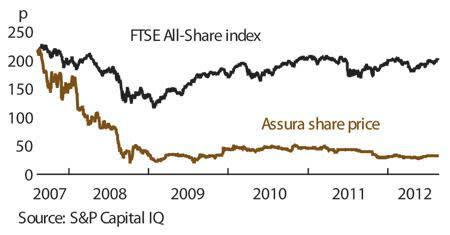Doctors' surgeries are about as safe as property investments come. NHS demand has nothing to do with the wider economy and is gradually growing with the ageing population and the fashion for treating patients at GP surgeries. Supply matches demand precisely - with only one tenant in the market, there's no speculative development. Accordingly, rents are not cyclical, as in other commercial property markets and instead grow with development costs.
- Stable healthcare market
- Valuation discount to peers
- Scope for dividend growth
- New management
- Lower dividends than peers
- Big debt pile
The only problem with this asset class is that it tends to come at a price. Those who followed our tips on Primary Health Properties (PHP) and the MedicX Fund (MXF) last year are sitting on substantial profits - so much so that the shares, never cheap, now look distinctly expensive (we have recently downgraded recommendations on both to hold). Meanwhile, shares in a third GP landlord - Assura (AGR) - trade at a 10 per cent discount to the end-March adjusted net asset value (NAV) and an even greater discount to that of their peers (see table). There are reasons for this but, on balance, Assura deserves to be re-rated.
| Company | Premium/ (discount) | Prospective dividend yield | Earnings yield | Loan-to-value ratio |
|---|---|---|---|---|
| Assura | (10%) | 3.5%* | 4.1% | 64% |
| MedicX | 18% | 7.3%** | 3.1% | 65% |
| PHP | 10% | 5.4%* | 3.6% | 56% |
| *Based on Espirito Santo estimates **Based on Edison Investment Research estimates | ||||
The most obvious problem with Assura is its track record, and a glance at recent full-year results shows just how unstable profits have been. But Assura's results have for years been marred by a disastrous diversification into healthcare services and this business has since been sold to Richard Branson's Virgin Group and the management team responsible for the strategy ousted. That leaves the original property business, which itself has a good track record, largely intact.
The new chief executive, Graham Roberts, who used to be British Land's finance director, is determined to make a clean break, which explains the hefty write-downs scarring this year's results. "Goodwill has no place on a property company's balance sheet," he says. He has just appointed a new finance director, Jonathan Murphy, who used to run Brooks Macdonald - very successfully judging by the wealth manager's share price growth.
ASSURA (AGR) | ||||
|---|---|---|---|---|
| ORD PRICE: | 32.5p | MARKET VALUE: | £171m | |
| TOUCH: | 32.5-33p | 12-MONTH HIGH: | 41p | LOW: 27p |
| DIVIDEND YIELD: | 3.5% | TRADING PROPERTIES: | £11.4m | |
| DISCOUNT TO NAV: | 14% | |||
| INVESTMENT PROPERTIES: | £538m | NET DEBT: | 188% | |
| Year to 31 Mar | Net asset value (p) | Pre-tax profit (£m) | Earnings per share (p)† | Dividend per share (p) |
|---|---|---|---|---|
| 2009 | 54.5 | -99.8 | -37.6 | nil |
| 2010 | 52.0 | 4.38 | 2.07 | nil |
| 2011 | 50.5 | 8.10 | 2.31 | 2.25 |
| 2012 | 35.5 | -63.3 | -13.8 | nil |
| 2013* | 38.0 | 9.30 | 1.75 | 1.14 |
| % change | - | - | - | - |
Normal market size: 8,000 Matched bargain trading Beta: 0.11 *Espirito Santo estimates (NAV and earnings figures adjusted and not comparable with prior years) †Adjusted for 2011's rights issue | ||||
Another criticism concerns its dividend yield, which is lower than that of peers. But that's because PHP and MedicX pay their dividends out of capital as well as out of cash profits. Strip out capital gains on properties and Assura's earnings yield (earnings per share divided by the share price) is actually the highest of the three.
What this means is that Assura's dividends have room to grow organically. Contrast that with MedicX and PHP, who announce a new acquisition or development almost every week in a frantic bid to improve their dividend cover. Moreover, Assura's NAV will not be eroded by the payouts - as has been the case in the other players' recent results.
A more valid criticism is that Assura has too much debt, with a loan-to-value ratio of 64 per cent. But the company's cost of borrowing, at 5.3 per cent, is still lower than the rental yield of its portfolio (5.9 per cent), so the debt does boost earnings. And its peers also have high loan-to-value ratios; debt cannot be the reason why Assura's shares trade at a discount.












